News of the day from select.Timeslive.co.za:
By Hannah Green
Continue reading at select.Timeslive.co.za.
By Admin
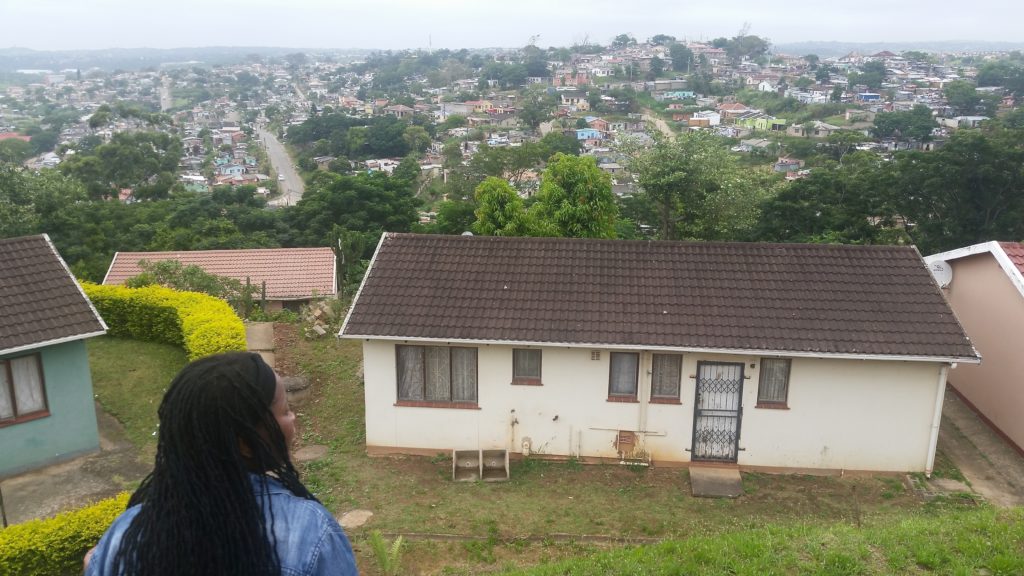
By Hannah Green
“For a municipality-built house, the home Nompilo Mkhize shares with her father and son in Durban’s Cato Manor is impressive.
The floors are tiled, the sitting room has a silver Samsung TV, and there is even a platter of fake wooden fruit decorating the coffee table. Mkhize’s father’s job as a driver for night-shift Prasa employees has treated them well.
South Africa is often described as a land of two nations, divided between a financially successful white minority and a large community of impoverished black Africans. But in Cato Manor the divide is not that simple…”
Continue reading at select.Timeslive.co.za.
By Admin
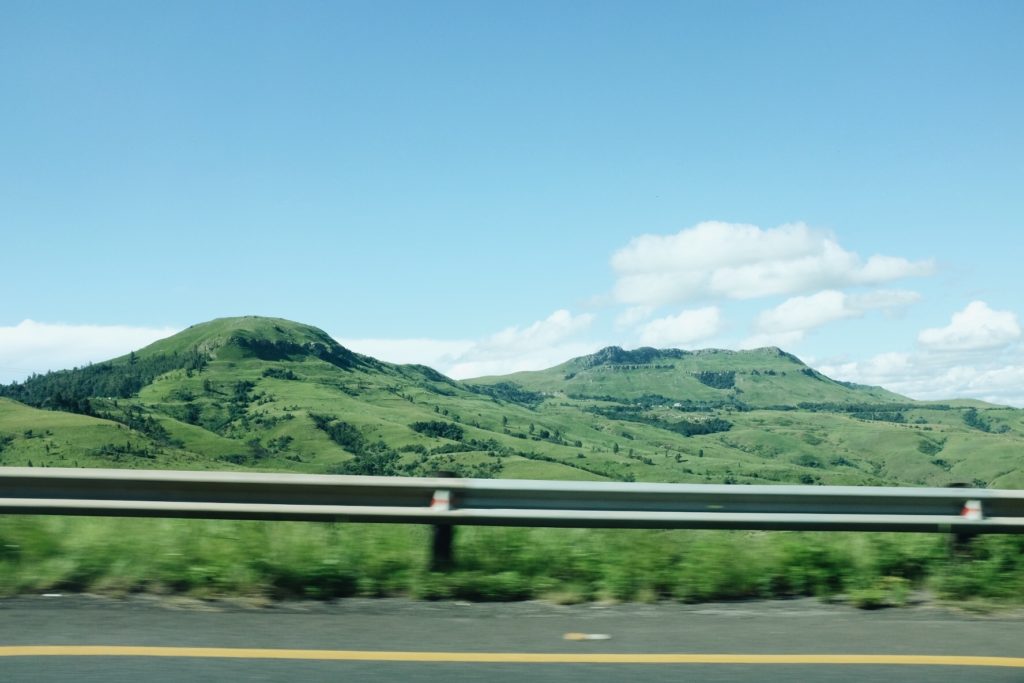
MAIN IMAGE: The rolling hills of rural KwaZulu Natal seen from the national road. The debate over ownership of land is heating up in South Africa. Photo by Serena Hawkey.
South African media were today reporting on tension between opposition leader Julius Malema and Zulu King Goodwill Zwelithini over Malema’s call for expropriation of land without compensation. Zwelithini has warned that his warriors are ready to defend the three million hectares of rural land controlled by the Ingonyama Trust, which he heads. The trust was established in 1994 and placed control of tribal lands in KwaZulu Natal under the king.
Today the Sunday Times reported that Malema accused Zwelithini of “intimidating” those who were calling for expropriation of land without compensation.
The news outlet said Malema told a press conference on Thursday, “There are no holy cows in this country. We must debate issues openly‚ including disagreeing with the Zulu king. The Zulu king must call for engagement with regards to the land. He must be respected‚ he must not be feared. I don’t fear anyone‚ no one. I only fear God.”
See reports on News24 and Sunday Times below.
Read more at Sunday Times or News24
By Admin
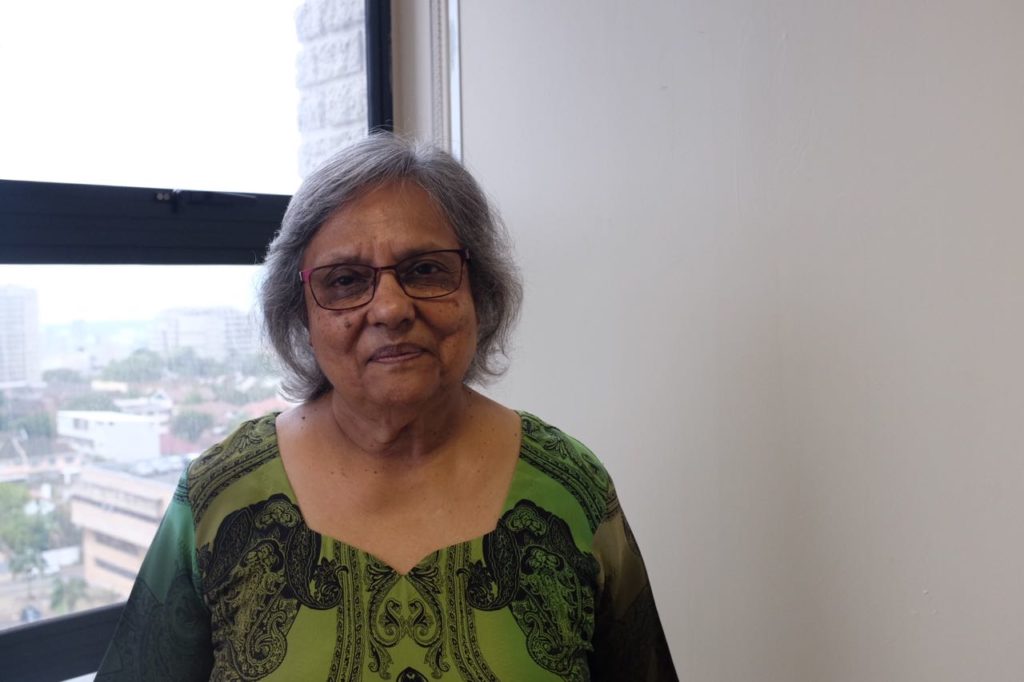
MAIN IMAGE: Portrait of Ela Gandhi taken by SIT student Serena Hawkey.
“He read the Quran, the Bible, all the scriptures so he could learn. These scriptures made him realize that there is something more to life. It’s about being more responsible, about the fact that everyone deserves to enjoy social justice,” Ela Gandhi reflects.
The man she refers to is her grandfather, Mahatma Gandhi, one of the most well-known historical figures around the globe. Known for his peaceful approach to conflict resolution, he showed mankind a new and nonviolent approach to political movements.
He was also an inspiration for his family, many of whom who have followed in his footsteps. Ela Gandhi has taken on political activism in her own life, previously serving as an ANC member of Parliament in the first democratic government and currently serving as a chairperson of the Gandhi Development Trust.
Speaking to a group of SIT students this week she said,“Contrary to what a lot of people believe —that he didn’t have a close relationship with his family — he was a very warm family member. He wrote letters to me up until the day he was assassinated — a seven-year-old. He felt it was important.”
Though Gandhi is widely known for his leadership in the fight for Indian independence from the British, he also had an influential impact in South Africa. He lived in the country for 21 years and had some of his first encounters with racism in Durban.
In 1893, Gandhi arrived in Durban to work as legal counsel for an Indian business firm. On a train ride from Durban to Pretoria, he was asked to move to a third-class car as Indian people were not allowed in first-class carriages. Gandhi had purchased a first-class ticket and refused. At the Pietermaritzburg station he was forcibly removed from the train.
Later on, while Gandhi was visiting a courthouse in Durban, he was asked by the local magistrate to remove his turban. Gandhi refused and walked out of the courtroom.
These events, along with growing legislative discrimination against non-white communities in the country, fuelled Gandhi’s involvement in South African social liberation movements. It also motivated the entire Gandhi family to speak for marginalised people.
Ela Gandhi, who is a social worker by training, was banned and subjected to house arrest for nine years by the Apartheid government. She remains passionate about the fight against inequality and non-violence.
Read more about Ela Gandhi and her work here Ela Gandhi Bio
By Admin
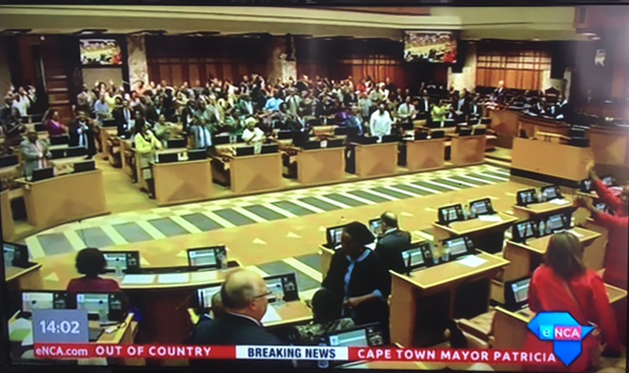
Main Photo: MPs seen on South African TV channel, eNCA, shortly before the parliamentary session was set to begin this afternoon.
Following President Jacob Zuma’s resignation last night, South Africa was today waiting for parliament to elect the country’s next leader. Deputy President Cyril Ramaphosa took over as the acting president of South Africa immediately after Zuma’s resignation. He was expected to be officially elected as the new president of South Africa in parliament this afternoon.
Ramaphosa has been deputy president of South Africa since 2014, and president of the ruling party since December 2017 when he won a succession battle against Jacob Zuma’s former wife, Nkosazana Dlamini-Zuma.
The presidential election this afternoon will replace a vote of no confidence that had been scheduled to be held in parliament today. The vote of no confidence motion was proposed by the opposition EFF, the Economic Freedom Fighters, who also called for the dissolution of parliament and for new national elections.
Prior to last night’s late-night resignation, the ANC parliamentary caucus had agreed that they would use their political majority to force him out in the EFF’s vote of no confidence. By resigning before the midnight deadline his party had given him, Zuma prevented the opposition from claiming victory for his departure.
Many South Africans have taken to social media to welcome Zuma’s resignation but some, particularly in Zuma’s home province of Kwazulu-Natal, have expressed unhappiness.
Zuma’s resignation comes after months of allegations of corruption against him. During his nine years as president of South Africa, allegations piled up accusing him of permitting the wealthy Gupta family to have undue influence over decisions of government, and of allowing inappropriate state spending on his personal home.
Even as Zuma offered his resignation, he remained adamant that he had done nothing wrong, and that the ANC had treated him unfairly by failing to tell him what they thought he had done wrong.
“I serve in my capacity as President of the Republic of South Africa within the prism of our much acclaimed Constitution, whose foundational values I fully subscribe to,” Zuma said during his resignation speech last night.
Ramaphosa is expected to deliver the State of the Nation address on Friday when he will speak to his vision for South Africa’s future.
UPDATE: February 15, 5:04 p.m. Cyril Ramaphosa was elected this afternoon as the president of South Africa. He was sworn in following the vote and will deliver the State of the Nation Address on Friday.
By Admin
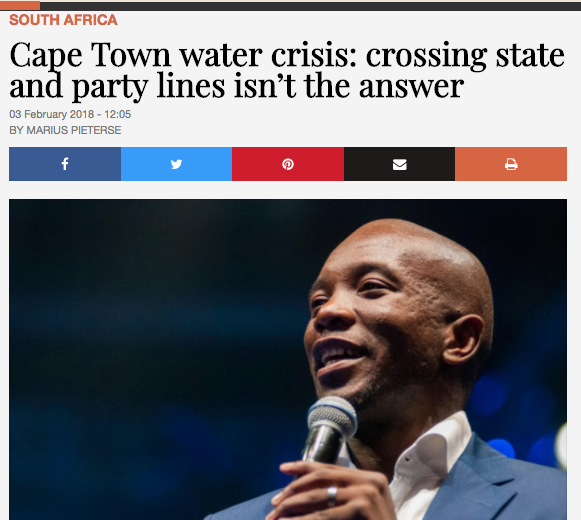
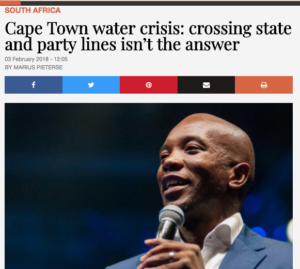
By Hannah Green
Cape Town Mayor Patricia De Lille, Democratic Alliance (DA), has been stripped of her responsibilities for her ineffective response to the city’s water crisis. This comes at a critical moment for the DA, which just recently overcame years of minimal political representation to gain power in the Western Cape Province.
In response to De Lille’s removal, the DA political party has taken over the city’s water task force. While this article addresses the constitutional implications of a political party stepping in to govern in place of an elected official, this crisis also has severe implications for the DA.
In a class discussion with Nicole Graham, DA Councillor and Deputy Leader, she explained how this removal could affect the party’s future. The DA is drawing criticism for removing the popular De Lille, which could reduce votes for the party in the Western Cape — the only province they have been able to capture since the party’s formation in 2000. After collecting approximately 22% of the vote in the last national election, Graham said this crisis could contribute to a decline in votes for the DA, hurting their role as the nation’s main opposition party.
By Admin
Cosatu strikes take over downtown Durban today in the spirit of anti-corruption, anti-state capture, and of course political advancement for the upcoming ANC elections.
According to this Sunday Times article, (https://www.timeslive.co.za/politics/2017-09-27-cosatu-gets-moving-on-its-ambitious-national-strike-against-state-capture/), Cosatu is marching for the president to appoint a judicial commission to look into state capture, and for the proceeds of state capture to be funneled into projects for helping the poor.
However, according to an article by Mercury, (https://www.iol.co.za/news/south-africa/kwazulu-natal/cosatustrike-durban-march-gains-momentum-11373968), many Cosatu affiliates at the marches have been seen wearing shirts supporting Cyril Ramaphosa’s presidential campaign today.
It is probable that the accumulation of Cosatu’s and the general public’s discontent with state capture naturally flows hand in hand with Cyril Ramaphosa’s political platform. In that case, today’s events are more than just political presence at a march to promote an upcoming election, but perhaps the surfacing of a widespread discontent with the current state of the economy which transcends political, and even trade union lines.
By Admin
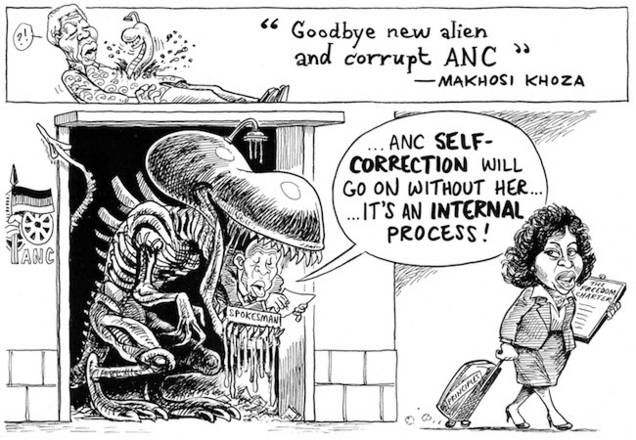
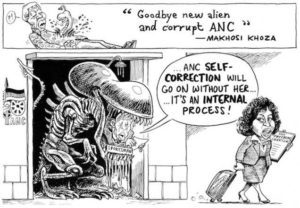 With the African National Congress national elective conference only a few months away, can the ANC rally behind whoever is elected? Can the party prevent factional splits until December arrives?
With the African National Congress national elective conference only a few months away, can the ANC rally behind whoever is elected? Can the party prevent factional splits until December arrives?
After continued criticism of the president, and a vote of no-confidence in August, former MP Makhosi Khoza has chosen to resign from the ANC. Is Khoza an outlier in the ANC constituency or the manifestation of a greater discontent within the ANC as a whole?
Come December the ANC will have at least six individuals contending for party leader. By the end of the conference one individual and one faction will rule the ANC. From there the ANC will be tasked with reuniting, opposing factions conceding to the majority, and the possible replacement of President Zuma. Failure to reunite could cost them their first loss in South Africa’s 2019 general election.
https://www.dailymaverick.co.za/zapirocartoon/goodbye-anc/
By Admin
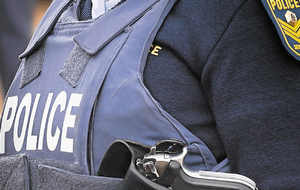
Police in the Western Cape have refuted claims that they are behind the R100-million upgrade of the Muizenberg Police Station.

The upgrade has sparked an outcry from people living in poorer areas.
When contacted the provincial police issued a statement claiming that the upgrade is a Department of Public Works project.
But the department claimed they were approached by police to do the job.
“[The SAPS] determine their budget‚ they determine the where and the when of building police stations‚ they approach the Department of Public Works with a request to do the work‚” said the department’s media and stakeholder relations officer‚ Thami Mchunu.
The Social Justice Coalition has called for the SAPS in the Western Cape to rethink the allocation of R100-million to Muizenberg.
The SJC maintains that police resources have historically‚ and continue to be‚ allocated to mainly white middle class areas at the behest of black communities that are ridden with crime. High risk areas in the Western Cape such as Nyanga have limited police resources in spite of being labeled as the murder capital of the country‚ the organisation noted.
“We cannot accept this deployment of resources. Muizenberg has safety unmatched by any of the poorer communities. It’s an easy solution‚ why not take this money and put it in those areas that need it most. Why should we have to suffer because we are poor. Everyone should have access to safety it’s one of the founding principles of democracy‚” Right to Know organiser Pupa Fumba said.
Organisers made a point of recognising the members of the community who had been harmed by the alleged misallocation of resources.
Sibusiso Mdlankomo‚ a lifelong resident of Khayelitsha‚ noted the heavy reliance his community has on SAPS.
“It’s not right for this area to get another station‚ when we can’t even afford private security. We rely completely on the police in our community. It’s time they provide us with the resources we deserve‚” Mdlankomo said.
According to the police statement they ”strive towards the equitable distribution of SAPS resources guided by crime trends and patterns as well as spatial growth and development”.
They pointed to the current construction of new stations in Tafelsig‚ Makhaza and Nyanga.
TMG Digital/TimesLIVE
By Admin
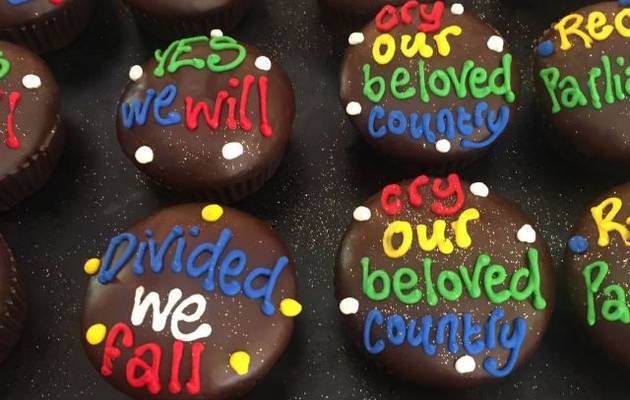
By Alexa Cole and Sealy McMurrey

Cupcakes decorated with political slogans proved to be a popular snack among many in the crowd waving posters‚ banners and flags.
Charly’s Bakery makes hundreds of cupcakes every day‚ and since Thursday night‚ the bakers have been creating specialty cupcakes in response to the protests against President Jacob Zuma.
Cupcakes were decorated with slogans such as “Recall Parliament”‚ “SA Must Rise”‚ “Divided We Fall”‚ “United We Stand”‚ “Cry Our Beloved Country”‚ as well as images of the South African flag.
Bakery owner‚ Jacqui Biess‚ said‚ “Cupcakes are a wonderful way to mobilize people”.
The bakery has a strong presence on social media‚ with over 100 000 followers on Facebook. Biess said she began advertising the cupcakes on Thursday night on social media and quickly started seeing retweets. “We had no idea if it would be dead today‚ but we’ve had a really good turnout‚” said Biess.
Cupcakes with slogans aren’t new to Charly’s. Biess said that whenever a big event happened‚ she and her daughters brainstormed when to write on their cupcakes that would elicit a giggle and have them flying off the racks.
Previous notable cupcakes have included “Honorable Speaker” in response to the Economic Freedom Fighter’s Julius Malema and his antics in Parliament. “Don’t touch me on my studio” was another in response to former AWB leader André Visagie’s infamous interview on the SABC and “Vote” cupcakes were a hit during the elections.
By Admin
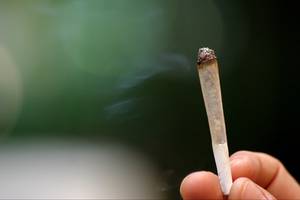
“The Anti-drug Alliance believes the High Court ruling‚ in favour of recreational dagga use‚ is “a win” for drug addicts. The alliance’s coastal director Andrew Stoller said that dagga could now be used as an “exit drug” in rehabilitation programmes.”
The alliance’s coastal director Andrew Stoller said that dagga could now be used as an “exit drug” in rehabilitation programmes.
“The argument has been used that it is a gateway drug but we have found that it can be used as an exit drug‚” said Stoller.
He said that in their experience in working with alcoholics dagga was used to effectively remedy addiction.
He said the judgement also meant that medical companies could start testing the plant’s medicinal effectiveness.
Judge Dennis Davis ruled in favour of Dagga Party leader Jeremy Acton who brought an application to decriminalise the private use of dagga and growing the plant.
Western Cape High Court rules in favour of private dagga use
Davis declared the limitations on the private use of dagga “unjustifiable” in terms people’s constitutional right to privacy.
“I smoked about ten joints‚ went into my heart and made my plea statement. I listened to the cannabis and used it to express my truth‚” said Acton outside the court in Cape Town where a crowd of about fifty pro-dagga activists sang – some even lit dagga pipes.
“Cannabis won this case today‚ I was just the vehicle‚” said Acton.
Emily Rizzo is on an SIT Study Abroad program and produced this story in association with Round Earth Media
– TMG Digital/The Times
1 Kipling Road • Brattleboro, VT 05302 • 802 257-7751 • 800 257-7751 (toll-free in the US)
SIT is a private nonprofit institution of higher education.
© Copyright World Learning, Inc.



